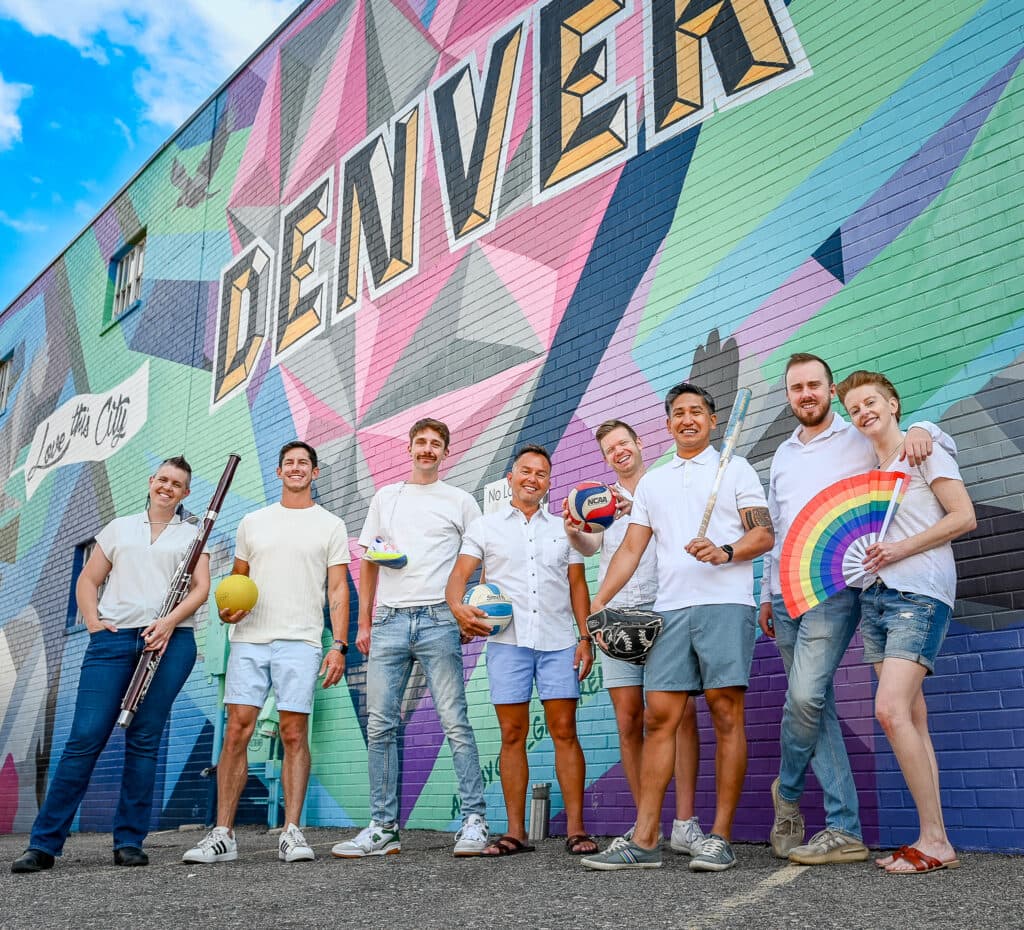Colorado has a bit of a notorious history with the Olympics.
In 1972, Denver became the first city to secure an Olympics — and then reject it. Led by a class of young politicians, voters shot down the plans for hosting the 1976 Winter Olympics over concerns about the environment and the use of taxpayer money for the event.
That’s not the end of the story. In 2019, Denverites passed a bill requiring voter approval for any potential future Olympics.
But that baggage isn’t stopping a group of LGBTQ leaders from trying to bring the Gay Games to Denver in 2030.
Organizers found out in May that Denver is the only city in the U.S. that made the shortlist of ten cities in consideration. (Our international competition includes Auckland, New Zealand; Cape Town, South Africa; Frankfurt, Germany; and others.)
The Federation of Gay Games — crucially, not at all connected to the Olympics for intellectual property reasons — will announce the top three in January 2025, and the final pick in 2026.
Jeff Wilson, a member of the marketing committee for the bid, anticipates that the event could bring around 12,000 international athletes from more than 100 countries to compete in 35 sports. If Denver secures the event, he thinks it could bring $110 million to the area’s economy.
Wilson envisions the event as an opportunity to showcase Denver’s culture beyond just sporting events. The committee is partnering with performing arts groups, nonprofits and sports programs to plan the potential event. The bid includes things like drag shows, a memorial, concerts and an Indigenous celebration.
“Imagine Pride weekend, but over the course of a week,” Wilson said. “The fact that there are still so many countries where queer people can't really feel accepted, having an avenue where they could come and celebrate queer culture with an international community … I think is really big.”

The Gay Games began in 1982 as a place for LGBTQ athletes to compete free of judgment.
Founded by Olympic decathlete Tom Waddell, the inaugural games in San Francisco hosted 1,300 countries from 12 countries. Like the Olympics, it takes place every four years in a different country.
“Back in 1982 when nothing like this existed … it was still incredibly taboo and nobody who put all of the work into becoming an Olympian or into becoming a high-level athlete wanted to jeopardize any of that by talking about who they really were,” Wilson said.
A lot has changed since then. Participation at the Gay Games surpassed 11,000 in recent years, while a record number of openly LGBTQ athletes — nearly 200 — are currently competing at the Paris Olympics.
Denver has changed in that time as well. A group of Denverites made an unsuccessful pitch for the bid in the early 2000s. Now, the city could be better positioned for success.
Denver’s population growth and variety of sporting facilities could make the new pitch stronger this time around.
Unlike the 1976 Olympics, Denver would not have to build many new stadiums to host the Gay Games.
Plus, the 2030 bid has the support of Mayor Mike Johnston and Gov. Jared Polis, who is the first openly gay man elected governor of a U.S. state.
Wilson said that Denver’s LGBTQ community also makes the city a good fit for the event. He’s the owner of gaydenver.com, a website that supports queer-friendly businesses and culture in Denver, and said he has seen the number of events and LGBTQ businesses grow in recent years.
“This is a pretty queer city, so we just want to be able to share that with the international community,” he said.
The effort to bring the Gay Games to the US comes as some states move to roll back LGBTQ rights.
The past few years have seen a record number of Republican-led anti-LGBTQ bills and book bans, particularly attacking transgender people. At the same time, LGBTQ rights codified by national and local Democrats
In Colorado, leaders across the aisle rebuked Colorado Republican leadership earlier this year for anti-LGBTQ comments. Meanwhile, in a state House led by Democrats, legislators have passed bills protecting LGBTQ rights.
Some families with transgender kids have moved to the state, fleeing red states with bans on medical care and athletics.
Wilson said he knows a number of people personally who left Colorado only to move back after facing anti-LGBTQ discrimination.
“Even in Colorado, in general, our system isn't perfect and we're not angels,” he said. “But at least I was able to get married to my husband two years ago and I don't have to live in fear that the state's going to take away my marriage license.”
If Denver hosted the Gay Games, he thinks it would send a statement to other cities across the country implementing anti-LGBTQ legislation.
“I fantasize about other cities looking at us and being like, ‘Look at the good time they're having. Look at all the money they made. Oh man, are we sure we want to be doing this?’” Wilson said.












